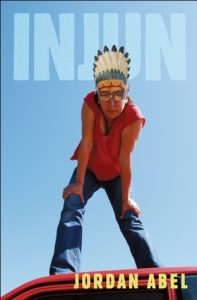Our introduction to conceptual poetry in ASTU 100 was Injun by Abel Jordan. In this book of poetry he took sentences from 91 classic Western novels in the public domain that contained the word injun, and reorganized the text for his own purposes. The first section reads as “normal” poetry, if a little hard to decipher meaning from. Later parts of the first section start to have gaps until whole pages are jumbles of letters and partial words, some upside down. Then the words come back into legible lines, but completely upside down. The next section, notes, groups sentences containing other words like “land”, “bloody”, and “faith”, but cuts them off, not allowing the full sentences to be seen. The final section is all the source sentences, but blank where the word injun originally would have been.
In this book of poetry he took sentences from 91 classic Western novels in the public domain that contained the word injun, and reorganized the text for his own purposes. The first section reads as “normal” poetry, if a little hard to decipher meaning from. Later parts of the first section start to have gaps until whole pages are jumbles of letters and partial words, some upside down. Then the words come back into legible lines, but completely upside down. The next section, notes, groups sentences containing other words like “land”, “bloody”, and “faith”, but cuts them off, not allowing the full sentences to be seen. The final section is all the source sentences, but blank where the word injun originally would have been.
Something interesting to me about Injun that we haven’t talked about in class is that it takes the form of written English at all. Most Indigenous languages in the Americas, like Nisga’a, the language of the Nisga’a nation that Abel belongs to, didn’t have a written form prior to contact with Europeans. We’ve spoken about this in Linguistics 101 as we study the consonant structure of Halkomelem (or rather Hunquminum), the Musqueam nation’s language, that was and is spoken on the land UBC is currently situated on. We have discussed the different writing systems used for different local Indigenous languages, which differ quite a bit as they were put together quite recently. But Abel’s book is not about providing visibility for reality of Indigenous language and culture that was misinterpreted and discriminated against in such offensive ways in these Western novels. Instead he is taking back space in the traditionally European sphere of writing and publishing, warping others’ words and traditions of the English language, similar to how Indigenous ways of knowing were warped during colonization.
I find it relevant that Abel uses these English books because in some situations, this type of text that he uses as a source was all that was left to represent the rich and diverse Indigenous peoples of the Americas. In some ways these texts were basically all he had to work with to be able to confront the master narrative of the “Indian”, considering how many Indigenous languages were wiped out or are now severely endangered, how colonizers tried to erase entire cultures. I am reminded of the lyric “every word that I’ve got is foreign to me” from the song “Foreigner’s God”. There is some acknowledgement and perhaps anger comes through in Injun, that English is needed to reach the masses with Abel’s message. More than that, as well, Abel decides not to give away knowledge of more realistic representations to the space (literature) where these peoples were so disrespected. Instead he dives into what the harmful stereotypes really do in these texts.
Writing this analysis, I do not want to overstep and make too many assumptions in my reading as a settler, but I think considering and discussing the very language of the poem is relevant in this situation. These are merely some of my musings on its significance, but I do not know exactly the intentions of Jordan Abel beyond the concept of reclaiming that he discusses at the end of the book.
Jaqi, this is a great post that demonstrates your understanding of the themes presented in “Injun” well. I particularly like how you reference the duality between how the book transforms from “normal” poetry to more abstract conceptual poetry. This is perhaps the most unique and interesting book I’ve ever read for a class, so it’s nice to see how another person interprets this wonky book. I think the broader conversation about indigenous literature and art is one that you touched on in your blog post, but can ultimately be explored much further. I think this is a great introduction to the themes presented in the text in a concise and organized manner.
Hi Jaqi, good post. I hadn’t thought about the meaning of how Injun was a written text in English before. Now that I’ve been exposed to it, I think that your take on how the book is meant to take back a traditionally European area of written and mass published stories is spot on. I don’t know if I quite spot the anger towards the need to use English that you refer to in the book, but I’ll definitely pay closer attention to that if I ever do another read.
Hey Jaqi, I found it really interesting how you mentioned relevant studies we were doing in Linguistics and applied it to this course. I have to say even though Linguistics is surely one of my favorite courses this semester, this thought never crossed my mind while reading Jordans poems. It completely puts the LACK of inclusion of something in Jordans work to a whole new level. I wonder how the meaning would change or be impacted if some sort of traditional language were more included. Thank you so much for sharing !
-zoe